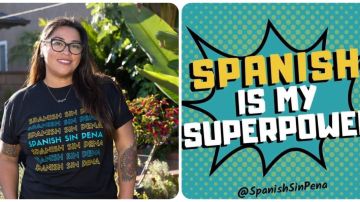I’m No Less Latina Because My Spanish Isn’t Perfect
Nowadays it feels like any minor offense can get your “Latinidad Card” revoked

Courtesy of Jackie Rodriguez/Spanish Sin Pena
Nowadays it feels like any minor offense can get your “Latinidad Card” revoked. If you don’t like spicy food, you’re not really Mexican, your hoops are too small, or your skin isn’t the right shade of whatever expectation they have put on you, then you’re not, according to those standards, not Latina. And forget it if you can’t speak perfect Spanish, they’ll take your favorite hoodie and embroider a Scarlet A style “Americanized Pocha” patch on it for you. Everyone is so quick to shame your parents for being “too lazy” to teach you Spanish. Even people close to you, primos, co-workers, they’re the first to feel comfortable enough to make fun of your attempts. They disguise it as cariño, but we low-key internalize all those words of shame and judgment and begin to build up our wall of insecurity.
The microaggressions from other Latinxs and strangers are based solely on assumptions as they label us “no sabo kids,” without knowing our stories.
There are many different reasons why folx don’t speak Spanish and although no one owes anybody an explanation, we often hear painful stories about elders in the Southwest, in New Mexico and Texas who have suffered being physically punished for speaking Spanish in school. For them, assimilation was a way to protect future generations from having to endure the pain they went through.
That generational trauma is very real for many which makes learning Spanish not only an educational journey but also one of self-awareness. It can bring up a lot about identity, colonization, and racism but also can be the start of a healing journey. The healing is so important, being constantly surrounded by these societal pressures of what Latino/a/x/e is and isn’t, can be emotionally draining, it takes a toll on our relationship with the Spanish language.
Have you ever thought about that, “What is your relationship with Spanish?”
It’s an entirely different experience when you’re trying to learn a language tied to your cultura and this is exactly how and why Spanish Sin Pena was born. My partner, Wendy Ramirez, recognized the emotional blocks and all the layers that impact Latinx in the U.S. speaking Spanish.
When Wendy approached me and asked what my relationship was with Spanish it made me reflect on growing up spending Saturday nights with Don Francisco watching Sábado Gigante, Caso Cerrado and Dos Mujeres en un Camino with my tias. I was memorizing Selena lyrics and singing my broken heart out before I even had my first boyfriend.
My mom was a young mother, she was 18 when she had me and was working and finishing school at the same time, so my tias played a huge role in my life. My dad’s side of the family didn’t speak any English but I didn’t have to understand everything they were saying to know they loved me. They always showed me with their excitement to see me, I tasted their love in the pozole, I felt it when they combed my hair into tight trenzas con limón and I heard it in their laughs as we played dominos and they snuck quarters under the table so I could keep playing. Language was never a barrier, they always appreciated that I tried and wasn’t embarrassed.
As I grew older and began my career, I was placed in professional settings where Spanish was expected and I felt so insecure. All of a sudden, my Selena lyrics weren’t helping me figure out how to explain federal policies to a room full of community members (mostly señoras), waiting to find out if these changes would change their status or health insurance benefits.
In those moments I’d think back on my tias and how much they appreciated me trying, even if I didn’t say things perfectly. Helping them figure out how to finish an application or call about a past-due bill helped them out way more than if I had stayed quiet and insecure.
I realized I had found my “why” I wanted to up-level my Spanish to be able to continue being a resource to my family and community. It doesn’t make me any more or less Latina, but it does allow me to connect, be an advocate and share important information especially with our elders.
Within the past year, I’ve been working on getting comfortable being uncomfortable and did my first Spanish interview on Telemundo and a Radio interview with Nuestra Voz on KPFK! Repeating over in my mind that my intentions are more important than my mistakes when it comes to speaking Spanish has really helped me through those interviews.
Latinxs come in all races, every shape, color, size, and ethnicity, Choosing to learn or not, is 100 percent up to you, it is a commitment and a whole process that can be emotional.
At Spanish Sin Pena we focus on community building so that you can get to the point where you feel safe to practice speaking. Hearing others share their experiences and learning that you’re not alone and being able to have a group to make mistakes with, feel safe to ask questions, and at times share emotional conversations together, that’s the most impactful part!
¡Juntos Somos Más Fuerte!

















